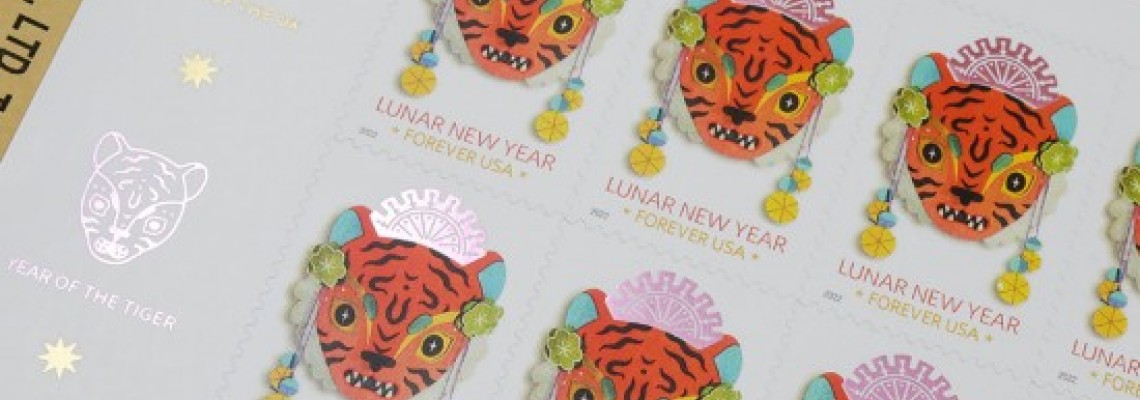

Year of the Tiger Roars In on New Stamp
“The Lunar New Year celebration fits squarely within America’s great cultural traditions. It is a time to prepare for a fresh start while honoring the past. ... It is an occasion to welcome good luck and prosperity,” said Ronald A. Stroman, a member of the USPS Board of Governors, who served as the stamp ceremony’s dedicating official.
He was joined by Michelle Yun, vice president of global artistic programs and director of the Asia Society Museum, and Anne del Castillo, commissioner of the New York City Mayor’s Office of Media and Entertainment.
“Lunar New Year is a time when Asians and Asian Americans honor their cultural heritage and traditions, and this stamp series celebrates their prominence and influence on U.S. history and culture,” del Castillo said.
The Year of the Tiger begins Feb. 1, 2022 and ends Jan. 21, 2023.
The tiger is the third of the 12 zodiac animal signs associated with the Chinese lunar calendar. Many ancient fables and legends explain the origin of the zodiac signs. The most common story tells of the animals racing across a river to determine their order in the cycle. The rat crossed by riding on the back of the ox, jumping ahead at the last minute to win the race. Next came the ox, then the tiger, rabbit, dragon, snake, horse, ram, monkey, rooster and dog, followed by the boar in last place.
As with other zodiac signs, personality traits and other attributes are often associated with people born in the year of a particular animal.
Those born during the Year of the Tiger may be seen as brave, confident and well-liked by others. Blue, orange and gray are lucky colors for tigers, and yellow lilies and cineraria may also bring good luck. Other predictions about important milestones in life are often made based on a person’s zodiac animal sign, including romantic compatibility, career trajectory and health prospects.
Lunar New Year is one of the most important holidays of the year for many Asian communities around the world, including in the United States, China, Vietnam, South Korea and Singapore. Across these varied cultures, many traditions exist for ringing in a new year of good luck and prosperity.
Known as Tet in Vietnam and the Spring Festival in China and elsewhere, Lunar New Year begins on the second new moon after the winter solstice and historically marks the arrival of spring. Filled with symbolic meaning, the colors red and gold appear everywhere during this auspicious time of year. Red is considered very lucky, while gold is supposed to bring wealth.
In the first few days of the new year, parades and pageants are common with dancers, acrobats and musicians. The festivities also mark a major occasion for folk artists making paper-cut crafts for celebration.
Lunar New Year celebrations culminate on the night of the first full moon after New Year’s Eve, known as the Lantern Festival in Chinese culture. In the United States and elsewhere, the festival is marked with grand parades and brilliant lanterns decorating public spaces.
In observance of this holiday, the U.S. Postal Service introduced its third series of Lunar New Year stamps in 2020. This new series will continue through 2031 with stamps for the Year of the Rabbit, Dragon, Snake, Horse, Ram, Monkey, Rooster, Dog and Boar still to come.
Art director Antonio Alcalá worked on the series of stamps with artist Camille Chew to create Lunar New Year imagery that is fresh, fun and celebratory. Calling to mind the elaborately decorated masks used in the dragon or lion dances often performed during Lunar New Year parades, Chew’s three-dimensional masks are a contemporary take on the long tradition of paper-cut folk art crafts created during this auspicious time of year.

Leave a Comment